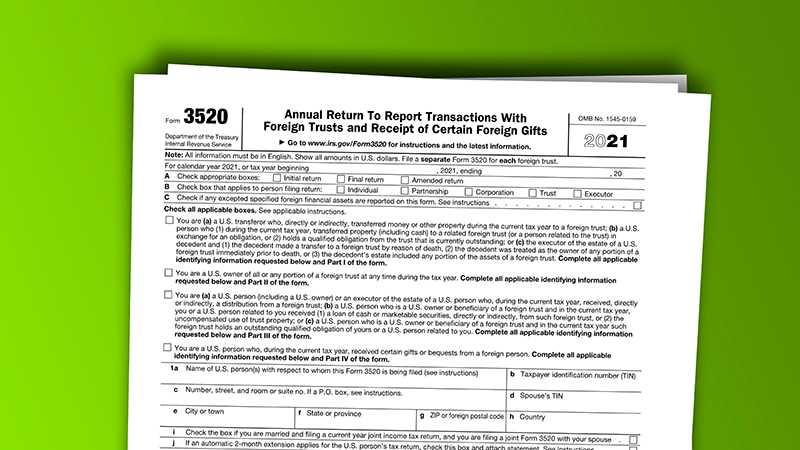10 critical things to know about IRS Form 3520 inheritance before filing
Exactly How Reporting Foreign Inheritance to IRS Works: Key Insights and Standards for Tax Obligation Coverage
Navigating the intricacies of reporting foreign inheritance to the IRS can be challenging. There specify thresholds and forms that people have to recognize to assure conformity. For example, inheritances exceeding $100,000 from non-resident aliens call for particular focus. Failing to comply with these standards might result in fines. Recognizing the nuances of tax obligation implications and essential paperwork is vital. The adhering to sections will certainly detail crucial insights and standards for effective tax coverage.
Comprehending Foreign Inheritance and Its Tax Obligation Ramifications
It is vital for them to comprehend the affiliated tax obligation ramifications when people get an inheritance from abroad. In the USA, acquired assets are usually not subject to income tax, but the estate where the inheritance comes may have particular tax obligation responsibilities. International inheritances can make complex matters, as various nations have differing laws concerning inheritance tax. People have to understand that while they may not owe taxes on the inheritance itself, they may be in charge of reporting the worth of the foreign possession to the Irs (IRS) Furthermore, currency exchange prices and appraisal methods can affect the reported worth of the inheritance. Recognizing these aspects is important to avoid unforeseen tax obligations. Seeking advice from a tax obligation expert skilled in global inheritance legislations can supply quality and assurance compliance with both united state and international tax obligation needs.

Coverage Demands for Inherited Foreign Possessions
The reporting requirements for inherited international properties involve details limits and restrictions that taxpayers must recognize. Compliance with IRS regulations necessitates the proper tax return and understanding of possible fines for failure to report. Comprehending these aspects is essential for people obtaining international inheritances to stay clear of lawful problems.
Coverage Thresholds and Purviews
While passing through the complexities of inherited international properties, understanding the reporting limits and limits set by the IRS is important for compliance. The IRS mandates that U. Form 3520 foreign gift.S. taxpayers report international inheritances surpassing $100,000 from foreign estates or non-resident aliens. This limitation relates to the total worth of the inheritance, including all possessions received, such as money, realty, and investments. In addition, any foreign financial accounts completing over $10,000 should be reported on the Foreign Checking Account Report (FBAR) Failing to comply with these limits can result in considerable charges. It is critical for taxpayers to accurately analyze the worth of acquired foreign assets to assure timely and certified reporting to the IRS
Tax Return Summary

Penalties for Non-Compliance
Failure to adhere to reporting requirements for acquired international properties can cause substantial fines for united state taxpayers. The IRS implements rigorous laws pertaining to the disclosure of international inheritances, and failings can cause penalties that are commonly significant. As an example, taxpayers may encounter a fine of as much as $10,000 for stopping working to submit Type 3520, which reports international presents and inheritances going beyond $100,000. Additionally, continued non-compliance can rise charges, potentially reaching up to 35% of the value of the inherited property. Failing to report can additionally activate much more severe repercussions, including criminal costs for unyielding disregard. Taxpayers should continue to be cautious to avoid these effects by making certain timely and exact reporting of international inheritances.
Secret Kinds and Paperwork Needed
When an individual obtains a foreign inheritance, it is important to comprehend the key types and documentation needed for conformity with IRS guidelines. The primary kind needed is the IRS Kind 3520, which should be submitted to report the receipt of the foreign inheritance. This kind offers comprehensive information regarding the inheritance, consisting of the identity of the foreign decedent and the worth of the inherited possessions.
Furthermore, if the acquired property includes international savings account or other economic properties, the individual may require to submit the Foreign Savings account Report (FBAR), FinCEN Kind 114, if the total worth surpasses $10,000. Correct documentation, such as the will or estate files from the international territory, should likewise be gathered to corroborate the inheritance case. Keeping detailed documents of all interactions and deals associated with the inheritance is essential for accurate reporting and compliance with IRS demands.
Tax Treaties and Their Influence On Estate Tax

Recognizing the implications of tax treaties is vital for individuals receiving foreign inheritances, as these agreements can significantly impact the tax obligations connected to acquired possessions. IRS Form 3520 inheritance. Tax treaties in between nations often provide details guidelines on just how inheritances are strained, which can lead to decreased tax responsibilities or exceptions. For example, a treaty might specify that specific types of inheritances are exempt to tax obligation in the recipient's country, or it may permit credit histories against tax obligations paid abroad
People must acquaint themselves with the specific provisions of appropriate treaties, as they can vary significantly. This understanding helps assure conformity with tax laws while maximizing possible benefits. In addition, understanding exactly how treaties interact with residential laws is crucial to precisely report international inheritances to the IRS. Consulting with a tax specialist fluent in international tax legislation might be suggested to browse these complex policies effectively.
Typical Errors to Prevent When Coverage Inheritance
Many individuals believe they can easily navigate the complexities of reporting foreign inheritances, they commonly forget critical information that can lead to substantial mistakes. One typical error link is stopping working to report the inheritance in the right tax year, which can lead to penalties. In addition, some people overlook to transform foreign possessions right into united state bucks at the suitable currency exchange rate, consequently misrepresenting their value. Another constant oversight includes misinterpreting the reporting limits; people may assume they do not require to report if the inheritance is listed below a particular quantity, which is inaccurate. Moreover, misclassifying the sort of inheritance-- such as dealing with a gift as an inheritance-- can make complex reporting responsibilities. Ultimately, individuals typically fall short to keep extensive documentation, which is crucial for validating claims and staying clear of audits. Awareness of these pitfalls can considerably enhance conformity and decrease the risk of economic repercussions.
Seeking Expert Assistance for Complicated Situations
Maneuvering the details of reporting foreign inheritances can be frightening, specifically for those with complicated financial circumstances. People facing issues such as numerous foreign properties, differing tax obligation implications throughout jurisdictions, or elaborate household characteristics might take advantage of professional help. Tax obligation professionals focusing on worldwide tax obligation regulation can provide important understandings right into the subtleties of IRS regulations, guaranteeing compliance while reducing potential responsibilities.
Engaging a state-licensed accountant (CERTIFIED PUBLIC ACCOUNTANT) or tax obligation attorney with experience in foreign inheritance can aid clear up coverage needs, recognize applicable exemptions, and strategize best tax approaches. They can help in completing needed types, such as Type 3520, and handling any type of extra disclosure needs.
Inevitably, looking for expert support can relieve stress and anxiety and boost understanding, permitting individuals to concentrate on the emotional elements of inheritance as opposed to ending up being overwhelmed by tax intricacies. This aggressive strategy can bring about a lot more positive results in the future.
Frequently Asked Questions
Do I Required to Record Foreign Inheritance if I'm Not a united state Citizen?
Non-U.S. citizens usually do not require to report foreign inheritances to the IRS unless they have specific links to U.S. tax regulations. Nonetheless, it's suggested to speak with a tax specialist to clear up individual conditions.
Exist Penalties for Failing to Record Foreign Inheritance?
Yes, there are penalties for falling short Get More Information to report foreign inheritance. People may encounter significant penalties, and the IRS might impose extra repercussions for non-compliance, potentially influencing future tax filings and monetary status.
Can I Subtract Expenses Associated With Taking Care Of Inherited Foreign Properties?
Costs related to handling inherited international possessions are normally not deductible for tax obligation objectives. Nevertheless, individuals ought to consult a tax specialist for assistance customized to their details situations and possible exceptions that might use.
How Does Foreign Money Influence the Value of My Inheritance Record?
International money fluctuations can significantly affect the reported worth of an inheritance. When converting to U.S - foreign gift tax reporting requirements. dollars, the exchange price at the time of inheritance and reporting figures out the final reported value for tax functions
What Occurs if My Foreign Inheritance Is Kept In a Trust fund?
It may make complex reporting demands if an international inheritance is held in a depend on. The trust fund's framework and tax obligation implications need to be analyzed, as recipients can face differing tax obligation responsibilities based upon jurisdiction and trust fund kind.
The IRS requireds that U.S. taxpayers report foreign inheritances going beyond $100,000 from foreign estates or non-resident aliens. Furthermore, any kind of foreign economic accounts amounting to over $10,000 need to be reported on the Foreign Financial Institution Account Report (FBAR) People inheriting international assets need to usually report these on Kind 8938 (Statement of Specified Foreign Financial Possessions), if the overall value exceeds certain limits. Depending on the nature of the inheritance, various other types such as Form 3520 (Annual Return To Record Purchases With Foreign Trusts and Invoice of Certain International Presents) may likewise be necessary. Additionally, if the inherited building consists of foreign financial institution accounts or other monetary why not try these out properties, the individual may require to submit the Foreign Financial institution Account Report (FBAR), FinCEN Form 114, if the complete value goes beyond $10,000.